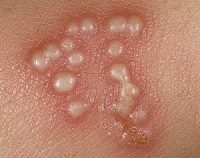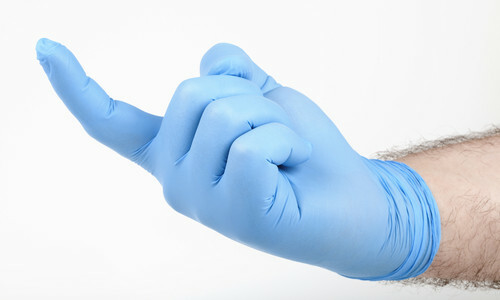Most of the venereal diseases, even acute, are successfully and completely treated with antibiotics of a certain group. What can not be said about such a disease as genital herpes. Faced with it once, the patient has to fight his whole life with this infection. In spite of the fact that the disease itself is not life-threatening, however, in the absence of proper treatment, it can lead to a number of consequences associated with poor health. Given that the disease gives the patient a strong discomfort, as well as social and psychological problems, each person should be aware of the ways of contracting herpes and observing the necessary preventive measures.

What should I know about genital herpes?
Sexual herpes is a very common sexually transmitted disease, which in most cases( in 80%) is transmitted with unprotected intercourse. The causative agent of the disease is one of the representatives of the family of herpes viruses( such are the viruses of herpes simplex type I and type II) and is similar to the herpes, which manifests itself all known "cold" fever with rashes on the lips. In the prevalence of this virus is on the second place among all infections that are transmitted precisely through sexual intercourse and are caused by oral and anal sex.
The results of statistics show that about 10% of young people under the age of 15 and 70% of the elderly population over 50 are subject to the herpes simplex virus. But this does not mean that most of the elderly population suffers from genital herpes. It all depends on which part of the body the virus is slumbering. In which place it is located, in that part it will be manifested, that is, either on the lips or on the genitals.
The infection process usually occurs when the disease worsens when an acute period of rashes occurs and is caused by:
- by direct transmission during sexual contact;
- by the household way of transferring the virus.
The first way of infection is dangerous in that there can be a transmission of the virus from the lips of the carrier to the genitals of the  of the infected person. The second way of infection is inherent even to those people who have never had sexual intercourse. They can get infected as follows - first touch the hands of herpes on the lips and, without washing or not washing their hands well enough, touch the genitals. Also acute is the issue of contamination with household items or clothing.
of the infected person. The second way of infection is inherent even to those people who have never had sexual intercourse. They can get infected as follows - first touch the hands of herpes on the lips and, without washing or not washing their hands well enough, touch the genitals. Also acute is the issue of contamination with household items or clothing.
In the absence of rashes, the risk of infection is significantly reduced, but it remains, especially since in most patients the disease can occur without visible manifestations. These patients do not believe that they are the direct and the main source of infection, by infecting their partners.
Once on the genitals by one of the described methods of infection, the herpes penetrates into the mucous membranes of the urinary tract, and then into the internal genital organs, penetrating into the cells. The infected cell begins to synthesize the proteins of the virus and create new particles that leave the mother cell, spread throughout the body. With excessive amounts of them begin to show symptoms of genital herpes.
How does the disease manifest itself?
Sexual herpes has a pronounced pattern of manifestation, which can not be noticed. At different stages of the development of the patient's illness, symptoms of a different nature may be disturbing, so it is advisable to read them in the order in which they are manifested. The disease passes through three stages. The first stage is manifested in the form of itching, pain and burning on the surface where the herpes should "pop out".Secondary symptoms of this stage are expressed:
- with genital pain;
- with pain and a sense of heaviness in that area of the thighs, which is closer to the genitals;
- numbness in the pelvic region, intensifying after sleep and intense sitting;
- increased body temperature, accompanied by a general malaise.
In the second stage of the patient, the rashes themselves are worried. In the beginning, redness appears, passing into numerous and small transparent bubbles. Vesicles, in spite of their size, are quite painful and cause discomfort to the patient. These rashes can be localized in different places. These are:
- external genitalia;
- pubis;
- buttocks and anus area( transmission of infection occurs after anal sex);
- inner thighs;
- urethra.
The third stage is characterized by a "burst" of vesicles with the formation of small ulcers in their place. The process is fast enough and takes from a few hours to 1-2 days. Next, the sores go to dry crusts with the subsequent regeneration of the tissue under them. After a certain time, the traces of herpes completely disappear.
In parallel with these symptoms the patient may be disturbed by symptoms of a psychological nature, manifested in the form of: depression, social phobia, nervous stress, insomnia, feelings of self-closure, fear of sexual intercourse, headaches. Often, genital herpes is not manifested in this way, as was discussed above itself. In some forms of the disease, there may be little or no manifestation of any characteristic of genital herpes. It is:
- about the atypical microsymptomatic form;
- about atypical macrosymptomatic form;
- is about asymptomatic form.
The first form is characterized by a complete absence of symptoms or their poorly expressed pattern of manifestation, which does not cause the patient any anxiety. The only symptoms are slight and slight itching, as well as a few small vesicles. The second form is characterized by the manifestation of not all symptoms, including tooth and pain sensations. The third form is the most dangerous, since it is characterized by a complete absence of any symptoms. The danger lies in the possibility of infecting your partner.
Diagnostic measures for genital herpes
Sexual herpes, as well as any other infectious disease, must be thoroughly diagnosed. To make a diagnosis, usually one visual examination of the doctor is enough. Sexual organs, thighs, anal opening, buttocks are subject to examination. To confirm the diagnosis, the physician can be guided by more reliable methods of analysis:
- by enzyme immunoassay, characterized by taking a blood sample and determining whether the organism is familiar with herpes viruses I and II.
- by a polymerase chain reaction performed only by liquid from vesicles;
- culture method, performed precisely during exacerbation in atypical form of the disease in order to establish the cause of the rash.
For the purpose of an accurate diagnosis, it is extremely important to select samples from several media at the same time. These are: prostate juice, sperm, urine.
Fighting genital herpes
The first signs of the disease should encourage the patient to make timely calls to the venereologist. The essence of the treatment of genital herpes is reduced to the relief of the symptoms of recurrence of the disease with the use of various painkillers and soothing drugs, special ointments and creams, as well as immunomodulating medications that help the body to fight the manifestations of herpes on its own.
As such is suppressive therapy aimed at suppressing the activity of the virus. This therapy involves the use of such antiviral drugs as: Acyclovir, Panavir, Famvir, Valaciclovir. The use of these drugs prevents the development and reproduction of the virus and reduces the frequency and duration of the disease.
Each patient should consider that the absence of treatment leads to complications such as:
- urethritis;
- prostatitis;
- recurrent rectal fissures;
- colpitis.
Compliance with preventive measures
Preventive measures are to avoid infection and muffle of attacks of exacerbation. In order not to develop genital herpes, one should adhere to certain rules that should become an obligatory part of a healthy lifestyle for a person. We are talking about:
- on an ordered sexual life;
- on abstinence from sex if the sexual partner has signs of disease;
- on the use of condoms;
- on strict observance of the rules of personal hygiene.
In the case of genital herpes has repeatedly bothered a person, should use some methods aimed at reducing the frequency and strength of relapses. This can be achieved if:
- maintains immunity with the help of adequate nutrition, a healthy lifestyle, and the use of vitamins;
- to carry out suppressive therapy;
- timely treatment of influenza, angina and other respiratory diseases;
- to reduce the amount of alcohol consumed.
And finally,
There is no definite opinion as to which people are most likely to be infected with genital herpes. But the statistics point to the next group of people who have the most frequent herpes virus. This is about:
- homosexuals;
- representatives of the Negroid race;
- female faces( they are more easily exposed to the process of infection, based on the natural characteristics of the body);
- persons suffering from various venereal diseases.
To this list should be added middle-aged people( from 30 to 40 years of age), given the increase in the number of sexual partners.



